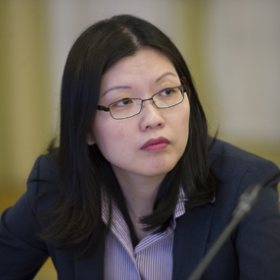
Xi Jinping and Future U.S.–China Ties
Chinese Vice President Xi Jinping visited the United States before his expected elevation to general secretary of the Communist Party of China (CPC) later this year and president of China in early 2013. EWI’s Piin-Fen Kok answers questions about the importance of the trip and the challenges facing China, its new leader, and the U.S.-China relationship.
Xi Jinping met with U.S. Defense Secretary Leon Panetta on this trip. What can we expect for military-to-military relations between the two countries if Xi indeed takes the helm in China?
The military-to-military relationship between the United States and China has been one of the most vulnerable areas of the bilateral relationship and has often been disrupted over issues such as U.S. arms sales to Taiwan or clashes off China’s exclusive economic zone. Currently vice chairman of the CPC’s Central Military Commission (CMC)—China’s top military policy decision-making body—Xi Jinping is expected to assume the chairmanship of the commission after taking over from Hu Jintao as general secretary of the CPC. In that context, the meeting with Panetta, like other meetings in Washington, had the forward-looking purpose of setting the tone of future military-to-military relations between the two countries amid China’s political transition.
Both Xi and Panetta said all the right things, including calling for further exchanges between the two militaries and identifying specific areas of cooperation. At the same time, both alluded to growing challenges to U.S.-China military relations. China has concerns about the U.S. strategic shift to Asia and the strengthening of its security and military alliances in the region. The United States has concerns about China’s military buildup and cyber attacks allegedly originating from China.
Tensions over issues such as U.S. arms sales to Taiwan and U.S. military activities off China’s coast will persist. Also worth noting is the fact that as CMC chairman, Xi will be a civilian overseeing a commission of senior military officers, on whom he will have to rely heavily for the handling of defense and military policy matters. It is expected that the CMC itself will have seven of its current 10 military members replaced in the upcoming leadership transition. These add some uncertainty over the direction of Chinese military policy under the new generation of military leaders. At least in the near term, those leaders may turn to a more assertive military policy in an effort to consolidate their power and show strength.
What if anything is truly new from this visit? Has policy moved, or was it mostly a publicity show and get-to-know-you session?
This visit has not yielded anything truly new on the policy front, as can be expected from a visit by a leader-in-waiting who would find it in his best interests to toe the party line while his succession to his country’s top posts isn’t yet guaranteed.
Some objectives of the visit were: to promote economic cooperation between the two countries in order to help them address their respective domestic economic challenges; for Xi and his U.S. hosts to garner insights into their counterparts and their policy thinking; and to ensure continuity during China’s political transition and an important election year in the United States in one of the world’s most important bilateral relationships.
The red-carpet treatment accorded by the United States—a rarity for a visiting vice president—and the concerted efforts by the Chinese government to play down divisions between the two countries over Syria just before Xi’s visit show the importance that both countries ascribe to this visit.
What are the most acute challenges that Xi Jinping will face as the new president of China?
His most pressing challenges will lie in leading his country and his party to manage the gamut of domestic economic and social challenges, primarily through the implementation of China’s 12th Five-Year Plan. On the economic front, efforts include restructuring the economy—away from a reliance on exports and toward higher domestic consumption—to ensure sustained economic growth and development, and addressing other concerns such as inflation and bubbles in the housing and asset markets. Social challenges include bridging the rising income gap, especially between the rural and urban areas, building social safety nets, protecting migrant workers, and controlling the increasingly numerous incidents of unrest across the country.
On foreign policy, Xi will have to manage China’s desire for a more active global role, the responsibilities that come along with that role, and China’s need to assure the rest of the world—especially its neighbors—of its commitment to “peaceful development.”
Piin-Fen Kok is Senior Associate for the China Program at the EastWest Institute.

